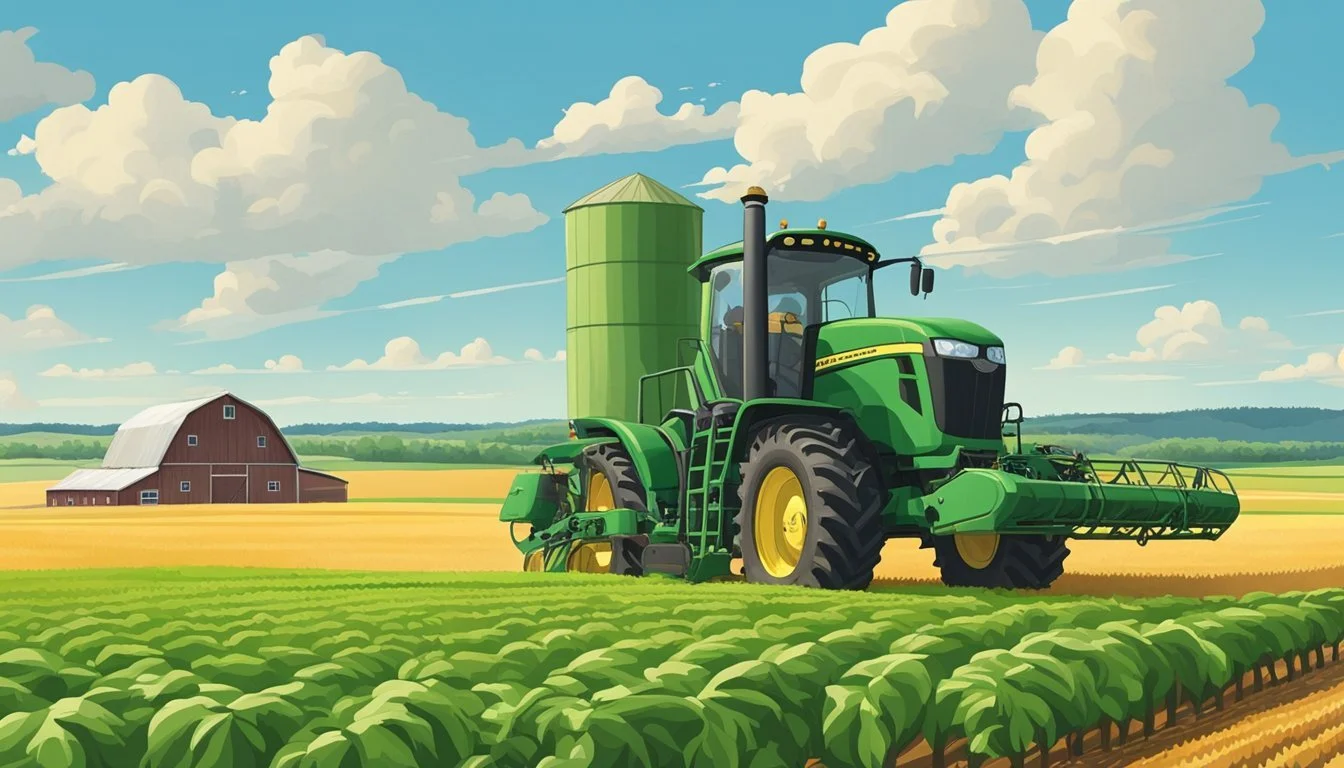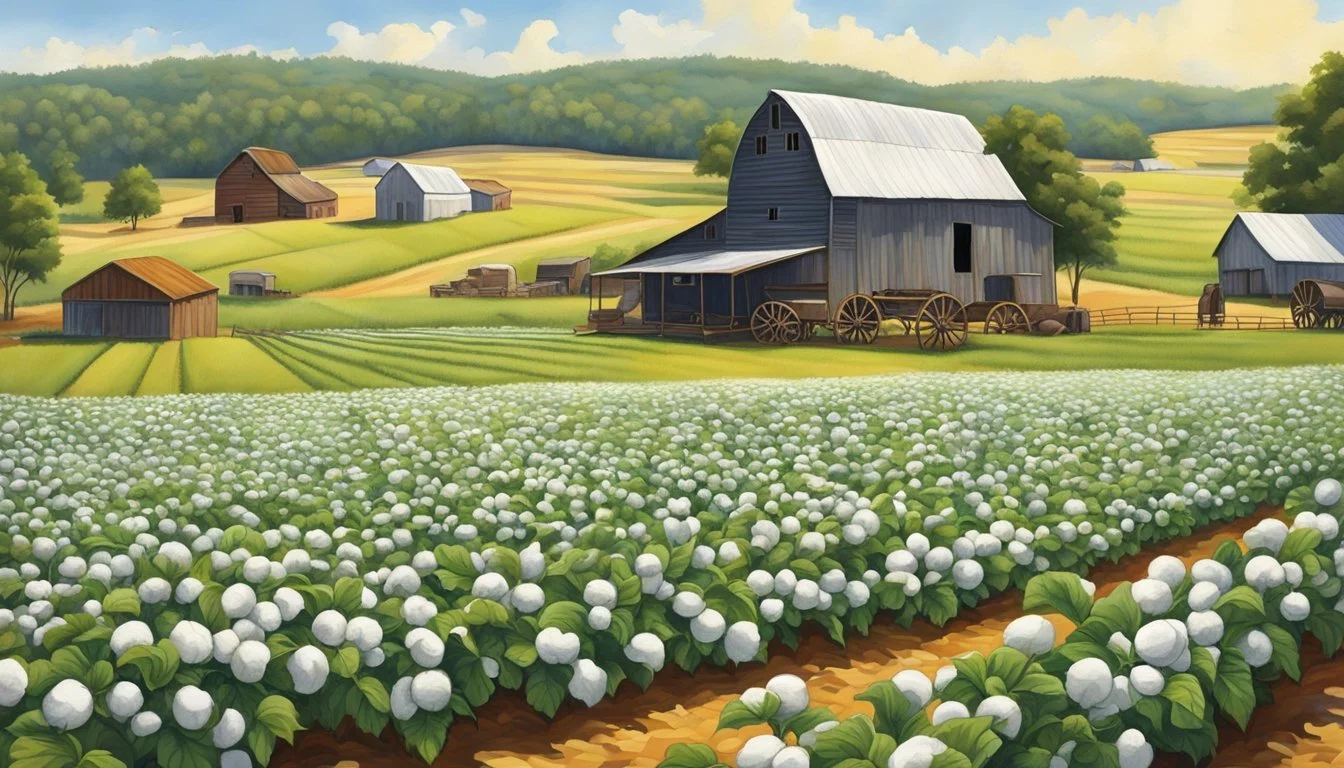Guide to Farming in South Carolina
Essential Practices for a Thriving Agribusiness
This Article is Part of Our State by State Farming Guide
Agriculture in South Carolina plays a pivotal role in the state's economy with vast tracts of land dedicated to farming activities. From the Atlantic plains to the rolling hills, the Palmetto State offers a conducive envihowronment for a variety of produce. South Carolina farmers predominantly engage in growing major cash crops such as soybeans, (how long do soybeans last?) corn, and cotton, supplementing them with a substantial production of peaches, melons, and tomatoes. The climate is amenable to agriculture, providing a long growing season that is particularly advantageous for fruit and vegetable farming.
The state has recognized the importance of agriculture and supports the sector with various programs and resources. Prospective farmers in South Carolina do not require licensing by the state's Department of Agriculture to start a produce farm or sell produce, which lowers the entry barriers for new farmers. Local resources, such as the Farm Service Agency (FSA), offer support and connections to further agricultural resources and programs, assisting both established and emerging farmers to navigate the industry effectively.
South Carolina's commitment to agriculture extends to education and community support, with initiatives that empower farmers and link them to markets. Programs like Certified SC Grown accentuate the importance of local produce while offering consumers a way to identify and purchase goods grown within the state. Local markets, educational opportunities, and farm-to-school programs foster a robust relationship between agriculture and consumers, strengthening the local economy and reinforcing the significance of farming in South Carolina.
Getting Started in South Carolina Farming
Embarking on a farming endeavor in South Carolina involves understanding the local agricultural landscape, addressing the essentials for beginning farmers, and meticulously selecting the right farm land suited to your desired crop or livestock.
Understanding Local Agricultural Landscape
South Carolina's agricultural landscape is diverse, offering opportunities for a variety of crops and livestock. Beginning farmers should familiarize themselves with regional climate variations, soil types, and local crops common to the area. Key resources such as the South Carolina Department of Agriculture and Clemson Extension can provide insights on state-specific farming foundations, crucial for aligning farming activities with local conditions.
Essentials for Beginning Farmers
For individuals initiating their journey into farming, grasping the basics is imperative:
Educational Resources: Online courses from local institutions, including Clemson University, may provide essential knowledge in fruit and vegetable farming.
Access to Capital: Financial resources for starting a farm can be found through state guides on federal and state agricultural resources.
Local Policies: Understanding local farming policies and guidelines is essential. The SC Department of Agriculture offers seminars and resources for new and beginning farmers to comprehend the regulatory environment.
Selecting the Right Farm Land
When choosing land for farming in South Carolina:
Location: Proximity to markets and weather patterns should be considered.
Size: The acreage required depends on the type of agricultural products you plan to produce.
Soil Quality: Evaluate the soil health to ensure it can support your farming needs.
Prospective buyers must analyze the land's potential for agricultural profitability alongside rural development policies that may impact land use.
Agricultural Practices for Success
In South Carolina, farming success hinges on the application of region-specific agricultural practices. Implementing effective methods for cultivation, animal husbandry, and adherence to organic principles, as well as following a tailored seasonal calendar, are crucial to thriving in the state's diverse agricultural landscape.
Cultivation of Crops
South Carolina farmers understand that the state's rich soil and favorable climate conditions are conducive to growing a wide variety of crops, particularly fruits and vegetables such as peaches, apples, and leafy greens. Corn is also a staple crop in the region. For successful cultivation, they focus on:
Soil Management: Regular testing and amendment of soil to ensure optimal pH levels and nutrient density.
Water Conservation: Efficient irrigation systems alongside rainwater harvesting to mitigate water stress during dry spells.
Pest Control: Integrated pest management strategies to maintain crop health with minimal chemical usage.
Raising Livestock and Animals
Animal husbandry is integral to South Carolina's agricultural ecosystem. Producers prioritize:
Welfare Standards: Ensuring adequate living conditions, including space, access to fresh water, and a balanced diet to promote animal health.
Sustainable Practices: Management of waste and reduction of greenhouse gas emissions to protect the air and soil quality.
Disease Management: Proactive health monitoring and vaccinations to prevent the spread of disease among livestock.
Organic Farming Principles
As demand for organic products rises, South Carolina's farmers are increasingly adopting organic farming principles:
Certification: Pursuing USDA Organic certification by adhering to standards that dictate the use of natural pesticides and fertilizers.
Biodiversity: Maintaining a diverse selection of crops and rotating them to improve soil health and reduce pest outbreaks.
Resource Management: Protecting water, air, and soil by minimizing the use of synthetic inputs and employing conservation tillage practices.
Seasonal Farming Calendar
Aligning agricultural activities with the seasons is vital. Farmers in South Carolina plan their year by:
Planting Schedules: Timing the planting of crops such as corn and tomatoes to coincide with the best growing conditions.
Harvesting Timelines: Monitoring crop maturation closely to determine the optimal time for harvesting to ensure peak flavor and nutrition.
Climate Adaptation: Adjusting planting and harvesting methods in response to weather patterns to protect crops from extreme conditions.
Marketing and Business Management
In South Carolina, the success of farming enterprises hinges largely on the development of robust business plans and the application of strategic marketing techniques. Given the state's diverse agricultural landscape, farmers who become proficient business managers and marketers can better connect with markets to promote local food and ensure business sustainability.
Developing Effective Business Plans
Farmers in South Carolina must begin with a comprehensive business plan that outlines their farming objectives and strategies. This plan should contain:
Financial projections: A clear understanding of costs, revenues, and profitability
Market analysis: Identification of target markets and customer needs
Creating a solid business plan not only provides a roadmap for the farm's operations but also positions farmers to be successful entrepreneurs.
Understanding Marketing Strategies
Effective marketing strategies are crucial for agribusinesses. Farmers should consider:
Branding: Developing a unique farm identity to stand out in the market
Local food promotion: Leveraging the growing demand for locally sourced products
By utilizing diverse marketing strategies, farmers become successful marketers who can navigate the competitive landscape of South Carolina's agribusinesses.
Connecting with Market Resources
To bridge the gap between production and consumer, farmers need to connect with various market resources:
Training: Regular participation in workshops for the latest marketing trends
Food hubs: Joining forces with local food hubs to reach a wider audience
These connections facilitate access to information, training, and platforms necessary for sound business managers wishing to sell their produce effectively.
Regulations and Support in Agriculture
South Carolina's agricultural sector thrives under a well-established framework of regulations and support services, ensuring that both safety and progress are prioritized. The state provides a strong support system for farmers, ranging from policy navigation to certification programs, aiding in the sustainable growth of agribusinesses.
Navigating Agricultural Policies
In South Carolina, agricultural policies are designed to oversee the diverse aspects of farming activities. Farmers must comply with regulations such as Regulation 61-43, which outlines standards for permitting animal facilities, and Regulation 61-82, which details the requirements for the proper closeout of wastewater treatment facilities. The South Carolina Department of Agriculture (SCDA) and Clemson Extension play pivotal roles in guiding farmers through these regulations, offering resources for compliance and educational programs.
SCDA: Provides regulatory information, marketing support, and promotes the "Certified SC Grown" branding.
Clemson Extension: Offers research-based knowledge and assistance with farm management and policy interpretation.
Food Safety and Certification
Food safety is paramount in South Carolina's agriculture industry. Farmers are encouraged to develop comprehensive food safety plans that adhere to state and federal guidelines. Certification programs, such as those certifying that products are locally grown, are managed by entities like the SCDA. These certifications not only elevate marketability but also ensure that food products meet high safety standards.
Food Safety Plan: A critical document that lays out procedures to minimize the risk of foodborne illnesses.
Certification Programs: Include training and audit programs for farms, which can lead to labels like "Certified SC Grown".
SC New and Beginning Farmer Program (SCNBFP): Supports new farmers with a focus on developing strong business and production practices, including food safety and certification processes.
Education and Community Engagement
Education and community engagement are vital for the growth and sustainability of agriculture in South Carolina. These initiatives provide farmers with the tools and knowledge necessary to thrive in the agricultural sector.
Participating in Workshops and Training
Farmers in South Carolina can benefit greatly from participating in various workshops and training programs. These educational events are designed to enhance skills and provide hands-on experience.
Clemson University Cooperative Extension: Offers a range of workshops that cover practical farming techniques, business planning, and market development.
South Carolina Department of Natural Resources (SCDNR): Engages communities with activities to promote outdoor recreation and conservation.
Leveraging Extension and Nonprofit Resources
Leveraging resources from extensions and nonprofits is a key strategy for farmer success.
Clemson Extension Agents: Provide one-on-one consultation and expert advice on farm management, crop production, and pest control.
ATTRA - National Sustainable Agriculture Information Service: Delivers the latest in sustainable agriculture and organic farming news, publications, events and funding opportunities.
Education: Through web resources such as growingsmallfarms.ces.ncsu.edu, farmers gain access to a plethora of information.
Agriculture Resources: The PDF Federal & State Agriculture Resource Guide is a useful tool for farmers looking for grants and further knowledge in agribusiness.
Sustainability and Environmental Stewardship
Sustainability and environmental stewardship are pivotal for South Carolina's agriculture sector. They ensure long-term productivity and enhance the quality of life for both rural and urban residents by addressing environmental concerns such as soil degradation and habitat loss.
Maintaining Soil and Air Quality
Soil Quality: In South Carolina, maintaining soil health is imperative for sustainable farming. Soil conservation practices, such as cover cropping and crop rotation, bolster soil fertility and structure, while minimizing erosion. Local organizations advocate for organic farming to reduce dependence on synthetic fertilizers and pesticides, thereby improving soil quality.
Air Quality: Farmers in the state are encouraged to employ practices that reduce air pollution. This includes managing livestock waste effectively and the adoption of farming equipment that meets emission standards. These actions contribute to better air quality and lower greenhouse gas emissions.
Wildlife and Ecosystem Management
Ecosystem Management: South Carolina's approach to ecosystem management involves balancing productive agriculture with the conservation of its diverse ecosystems. Practices such as buffer strips along waterways protect habitats and enhance biodiversity whilst also preventing runoff.
Wildlife Management: Farmers are recognized as exemplary stewards of land critical for wildlife. By integrating wildlife-friendly practices, such as maintaining wetlands and woodlands, they contribute to the conservation of local species and the overall health of ecosystems.
The commitment to these environmental stewardship principles aligns with the USDA's Conservation Stewardship Program, which rewards farmers for these sustainable practices. Furthermore, the focus on SWAPA—soil, water, air, plant, and animal resources—ensures a comprehensive approach to agriculture that preserves South Carolina's natural wealth.
Economic and Industry Overview
South Carolina's agribusiness is a critical component of both the state's economy and its identity. It has exhibited substantial growth, making it a sector of tremendous importance.
Industry Trends and Production Analysis
Agriculture in South Carolina includes a variety of crops and livestock, with poultry showing significant influence within the industry. The state's agribusiness, which comprises both agricultural and forestry operations, follows a balanced distribution:
Agriculture: 55%
Forestry: 45%
The state has been experiencing notable trends, such as a 40% growth rate in agribusiness between 2010 and 2020, highlighting its expanding contribution to the local economy and its capacity for future opportunities.
Contribution to Local and National Economy
South Carolina's agribusiness has a direct and significant impact on the economy with an estimated annual economic contribution exceeding $51.8 billion. Moreover, the sector supports over 259,000 direct jobs, indicating its influence on employment. The produce and products from the state are not only paramount locally but also play a vital role in the national economy through interstate trade and exports.
Specific Crop and Livestock Profiles
South Carolina agriculture thrives on a diverse array of crops and livestock, with specific profiles for poultry and egg production, a rich variety of fruits and vegetables, and vital sectors like cotton and dairy farming.
Poultry and Egg Production
The poultry industry, particularly broilers and turkeys, represents a significant segment of South Carolina's agriculture. Broiler chickens, raised primarily for meat, are a top commodity in the state. The production of eggs also contributes to the agricultural output, with numerous farms participating in both layers for egg production and hatcheries for poultry breeding.
Fruits and Vegetable Varieties
The state's warm climate is conducive to a variety of fruits and vegetables. High-value crops include peaches, which lead the fruit sector, and watermelons, known for their sweetness and size. The fruit profile also extends to apples, blueberries, grapes, and strawberries, with tomatoes, potatoes, beans, beets, and squash standing out in the vegetable category. Specialty fruits like papaya highlight the diversity and adaptability of South Carolina farms.
Key Fruits:
Peaches
Watermelons
Apples
Blueberries
Grapes
Strawberries
Key Vegetables:
Tomatoes
Potatoes
Beans
Beets
Squash
Cotton and Dairy Farming
Cotton, one of the traditional crops of South Carolina, remains a cornerstone of the state's agriculture, with carefully managed harvesting to ensure quality and yield. Dairy farming, although smaller in scale compared to poultry, still contributes significantly to the agricultural landscape. Farms focus on the production of milk and other dairy products, adhering to high standards of animal welfare and product quality.
Heritage and Culture of South Carolina Farming
South Carolina's agricultural lineage extends deep into its history. Farming, a foundation of the state's cultural fabric, showcases a heritage that has been celebrated through centuries. The South Carolina Century Farm Program encapsulates this pride by recognizing farms retained within families for over a hundred years. The legacy of these farms is not just in their longevity but also in their ability to adapt and continue contributing to the local and southeastern ag economies.
Agriculture in South Carolina is drenched in heritage. It is not uncommon to find multigenerational farm owners who cherish and continue the traditional farming practices of their ancestors while integrating modern techniques. This blend pays homage to the past while embracing the future, making it both a preservation and an evolution of local customs.
The cultural tapestry of the region is evident in the Lowcountry Local First, an initiative that emphasizes the importance of local farming and sustainable agriculture. Fun is a byproduct of their community events and farmer's markets, which are designed to celebrate and support local farmers. These gatherings not only serve as a meeting point for local consumers and producers but also act as educational platforms to highlight the importance of agriculture in everyday life.
Furthermore, the Bart Garrison Agricultural Museum of South Carolina and the Agricultural Heritage Museum in Blackville are pivotal in educating the public about the state's agricultural history and its heritage. These institutions showcase the significance of farming through various exhibits and school-based activities, casting a light on how agriculture has shaped the state's culture and economy.
By embracing its agricultural roots, South Carolina stands as a bastion of tradition and progress, exemplifying how heritage and modern practices can coalesce to sustain the cultural identity of a region.










